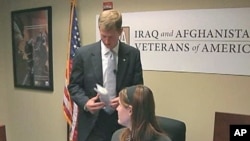Even in tough economic times, Americans are still giving generously to nonprofit organizations. Donations to charities that claim to help U.S. troops rank highly among those gifts.
As recent investigations by the U.S. states of Ohio and Virginia have indicated, however, there are questions about how much of this money actually goes to help service members.
"We've got your backs," the announcer intones. That's the message the Iraq Afghanistan Veterans Association (IAVA) said is sent each time an American gives money in support of soldiers and their families.
For many Americans, donating fulfills a desire to give back. Others give to receive tax benefits. And for some, it's a way to be closer to a decade-long war they've only known in the media.
For IAVA it's a philanthropic trend that has served as a lifeline, said Tim Embree, a reservist who served two combat tours in Iraq and now works for IAVA.
"When we first started these two conflicts, there were a lot of folks coming home to nothing... These groups came up and they filled that void on their own, because they saw that need," said Embree.
That void is now filled by more than 1,400 veterans groups that have applied for nonprofit, tax-free, status since the war in Afghanistan began.
As U.S. troops return from the battlefield, Americans are increasingly being asked to donate money to charities claiming to help the troops.
The money is collected to assist soldiers with everything from war zone comforts, to funding the treatment of life-altering battlefield injuries.
Since returning home from Afghanistan, Lieutenant-turned-veteran-turned-volunteer Kristen Murdock has seen the fundraising firsthand.
"People always question where the money goes," said Murdock. "They see you're having fundraisers, you're asking for donations, but people don't always see where it goes."
In the past decade, only one veterans group has been denied the special tax privileges given to nonprofit organizations. But knowing if donations are really going to help service members can be a problem, said Bennett Weiner of the charity watchdog division of the Better Business Bureau.
"When there's opportunity and motive good organizations will get involved. But also some con-artists, and those with ulterior motives, unfortunately, will strike while the iron is hot, as well," said Weiner.
One of those alleged con-artists is a man who goes by the name Bobby Thompson.
He has been indicted on charges of theft, money laundering, and corruption, for allegedly using an identity stolen from a Navy veteran to create a fake nonprofit called the U.S. Navy Veterans Association.
Voice of America attempts to locate the headquarters of the U.S. Navy Veterans Association led to a commercial postal facility in Washington, D.C., where their registered box is not even large enough to handle requests for donations, in the name of troops, sent to just one American household over a two week period”
Ohio prosecutors claim the scam funneled money - given for needy troops - to several high-profile Republican political campaigns.
The conspirator would then attend political events, grabbing snap shots with party leaders, including former President George W. Bush, allegedly attempting to build credibility for his fraudulent charity.
Thompson is now the subject of a nationwide manhunt, with nearly $100 million still unaccounted for.
Legitimate organizations, like the Iraq Afghanistan Veterans Association, hope charity scams don’t prevent people from giving to worthwhile groups that do assist service members.
"If you come across an organization maybe that doesn't pass the smell test, I think pretty quickly you'll leave it and you'll stop supporting that organization and you'll turn to one that does," said Embree. "The average American person is pretty darn smart and can figure it out pretty darn fast."
Those tasked with monitoring charities, though, warn it's a case of donor be diligent.
"Be careful when you make a donation decision, because there are, unfortunately, veterans and military charity groups that are not well managed, or bad actors that may be seeking to take advantage," said Weiner. "They are the exception to the rule, but they're out there."
An exception to the rule, with a hefty price tag for those who have already risked so much for America.




